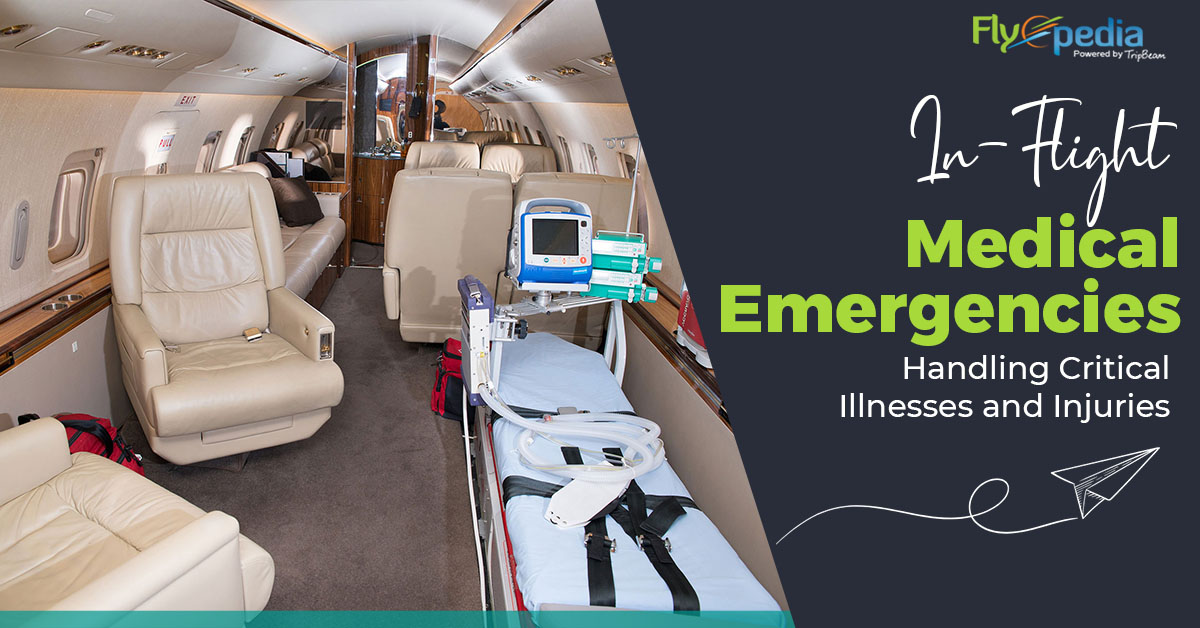When you buy your flight ticket from Canada to India and head for your summer vacation, the last concern is getting sick on the plane. However, medical emergencies in the air are more frequent than you might realize. What happens if you suffocate, faint, or get sick while flying? Flyopedia will describe the procedure for handling medical emergencies on commercial flights. Continue reading to find out how to handle the demands of critically ill and severely injured customers on planes.
Medical Emergencies that Could Happen on a Plane
Common In-Flight Medical Emergencies:-
- Seizures
- Cardiac symptoms
- Nausea or vomiting
- Respiratory problems
- Lightheadedness or fainting
Rare In-Flight Medical Emergencies:-
- Ear pain
- Headache
- Laceration
- Cardiac arrest
- Obstetrical or gynecological symptoms
Even if you book cheap business class tickets to India, there is no such thing as a risk-free flight regarding health and safety.A medical emergency occurs on about one out of every 600 commercial flights, according to research. It corresponds to over 44,000 flights each year worldwide, highlighting the importance of airlines being prepared to manage these scenarios.
Types of Medical Emergencies on a Flight
Medical emergencies on flights from the USA to Delhi can be classified as health-related or injury-related:
Health-Related Issues:-
- Gastrointestinal problems
- Allergic reactions
- Shortness of breath
- Heart attacks
- Strokes
- Anxiety about the flight
- Dizziness and fainting
- Food poisoning or communicable diseases
Injury-Related Issues:
- Scalds or burns from galley ovens or hot liquids
- Injuries from onboard altercations
- Luggage falling from overhead bins
- Turbulence-related injuries
High altitude can increase the risk of in-flight medical events. While airlines pressurize their cabins, they are not necessarily pressurized to sea level, leading to passengers breathing in dry air. This environment, combined with confined spaces and long periods of immobilization, can cause issues like deep vein thrombosis, particularly in passengers with cardiovascular or respiratory issues, recent surgeries, or plaster casts.
Handling Medical Emergencies Onboard
Flight Attendant Training and Supplies:-
Equipped with first-aid training and basic medical supplies such as bandages and cold packs, flight attendants can address minor injuries but are not qualified to manage serious medical emergencies due to limited expertise and resources.
Protocols:
Airlines follow strict protocols for medical emergencies, ensuring the crew knows how to proceed.
Discovery:
Flight attendants may become aware of a medical issue through direct observation or notification by a travelling companion or nearby passenger. The first attendant on the scene will take charge and notify the rest of the crew.
Response:
The response depends on the problem’s nature, urgency, and the flight phase. No decisions are made until the assessment and diagnosis are completed unless the passenger is in a life-threatening condition.
Assessment:
The initial evaluation varies based on the patient’s condition. If awake, the flight attendant will ask about their distress. If unresponsive, the ABCs of first aid are checked:
Airway:– Is it blocked?
Breathing:– Is the passenger breathing?
Circulation:– Is there a detectable heartbeat?
If the response is negative, the flight attendants will perform proper first aid, such as the Heimlich maneuver as well as CPR. If you are a first-time flyer then you should consider reading Beginner’s Guide to Flying, for a smooth travel experience.
Medical Supplies Available on Commercial Aircraft
Commercial aircraft typically have several types of medical equipment to handle various emergencies:-
- First-Aid Kits:– These kits include supplies for treating non-life-threatening injuries like cuts, burns, and broken bones.
- Therapeutic Oxygen:– Before the trip, you can ask for portable oxygen tanks, regulators, and masks. Cabin crew can give oxygen to passengers who have trouble breathing or need extra oxygen.
- Emergency Medical Kit:– This kit includes various medications and medical instruments for diagnostic and invasive procedures. However, only a licensed medical practitioner can access and administer the contents.
- Automated External Defibrillator:– Most flights include an AED for cardiac crises. Flight attendants are educated in CPR and certified to operate this equipment.
It is important to note that commercial aircraft are not designed to handle every medical emergency, and the cabin crew has limited medical training.
Commercial Medical Escorts
Those with non-urgent medical needs requiring transportation are advised to have a medical escort, also known as a patient escort. These specialists accompany patients on commercial flights, assuring their safety and comfort throughout the trip. Patients may sit in a standard seat or, if necessary, ride on an airline-provided stretcher. This service guarantees that people with medical requirements can travel safely and comfortably to their destinations. You can also have this patient escort facility when you purchase last minute flight to India through flyopedia.


